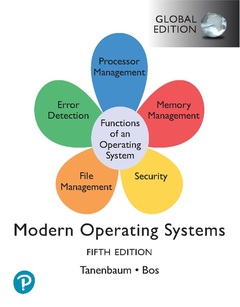Description
Modern Operating Systems, Global Edition (5th Ed.)
Authors: Tanenbaum Andrew, Bos Herbert
Language: English
Subject for Modern Operating Systems, Global Edition:
1184 p. · 18x23 cm · Paperback
Description
/li>Contents
/li>Biography
/li>Comment
/li>
Modern Operating Systems incorporates the latest developments and technologies in operating systems (OS) technologies. Author Andy Tanenbaum's clear and entertaining writing style outlines the concepts every OS designer needs to master. In-depth topic coverage includes processes, threads, memory management, file systems, I/O, deadlocks, interface design, multimedia, performance tradeoffs, and trends in OS design. Case studies explore popular OS and provide real-world context. Tanenbaum also provides information on current research based on his experience as an operating systems researcher.
The 5th Edition keeps pace with modern OS with a new chapter on Windows 11, new security coverage, an emphasis on flash-based solid-state drives and more.
- Introduction
- Processes and Threads
- Memory Management
- File Systems
- Input/Ouput
- Deadlocks
- Virtualization and the Cloud
- Multiple Processor Systems
- Security
- Case Study 1: Unix, Linux, and Android
- Case Study 2: Windows 11
- Operating System Design
- Reading List and Bibliography
About our authors
Andrew S. Tanenbaum has an S.B. degree from M.I.T. and a Ph.D. from the University of California at Berkeley. He is currently a Professor Emeritus of Computer Science at the Vrije Universiteit in Amsterdam, The Netherlands. He was formerly Dean of the Advanced School for Computing and Imaging, an interuniversity graduate school doing research on advanced parallel, distributed, and imaging systems. He was also an Academy Professor of the Royal Netherlands Academy of Arts and Sciences, which has saved him from turning into a bureaucrat. He also won a prestigious European Research Council Advanced Grant.
In the past, he has done research on compilers, operating systems, networking, local-area distributed systems and distributed systems. This research has led to over 200 refereed publications in journals and conferences. Prof. Tanenbaum has also authored or co-authored 5 books, which have been translated into over 20 languages, ranging from Basque to Thai. They are used at universities all over the world. There are 163 versions of his books.
Prof. Tanenbaum has also produced a considerable volume of software, notably MINIX, a small UNIX clone. It was the direct inspiration for Linux and the platform on which Linux was initially developed. The current version of MINIX, called MINIX 3, is now focused on being an extremely reliable and secure operating system. Prof. Tanenbaum will consider his work done when no user has any idea what an operating system crash is. MINIX 3 is an ongoing open-source project to which you are invited to contribute. Go to www.minix3.org to download a free copy of MINIX 3 and give it a try. Both x86 and ARM versions are available.
Prof. Tanenbaum's Ph.D. students have gone on to greater glory after graduating. Some have become professors; others have fulfilled leading roles in government organizations and industry. He is very proud of them. In th
Hallmark features of this title
- In-depth topic coverage includes processes, threads, memory management, file systems, I/O, deadlocks, interface design, multimedia, performance tradeoffs, and the newest trends in operating systems (OS) design.
- Multimedia file systems are covered in detail, an important topic that most books miss.
- Thorough treatment of computer security includes viruses, worms, malware and other digital pests. Practical guidance is also provided on ways to combat and defend against security threats.
- Full-chapter case studies explore current OS in real-world detail.
- A clear and entertaining writing style outlines the big-picture concepts every OS designer needs to master.

